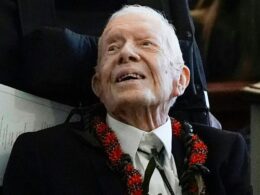It’s hard to bust a move when the music has no “soul.”
A Bronx break dancing pioneer is thrilled the sport was featured for the first time ever at the Olympics Friday — but said dancers are suffering through “soulless” beats and massive crowds that make it hard to find their own unique “flavor.”
“I heard some of the music and it was trash,” Bronx break legend Richard “Crazy Legs” Colón told The Post.
“It was just a modern kind of break beat you could tell is computerized — there was no funk or soul,” he said. “It leaves the dancers having to find a vibe.”
Colón, 58, cut his teeth in the 1970s breaking in parks and tenements in the Bronx — the birthplace of the semi-acrobatic, improvised dance form.
The trailblazing b-boy — who helped introduce breaking to the world by appearing in the 1983 movie “Flashdance” — is also credited for creating the dazzling and difficult “windmill” move.
To perform it, a dancer rolls their torso on the floor while twirling their legs in a V-shape through the air.
While Colón is “excited” for breaking to take the world stage in Paris, he said it’s a far cry from the art form’s Boogie Down street roots.
“Olympics was never the ultimate goal — it was about community, having fun and not having anything else. That’s what us black and brown people do,” he said.
He said there are simply “limitations” to performing in a massive arena with formal rules.
“When you’re far from the people, it’s harder because you’re not feeling their energy,” he said. “Out in the community, that’s where you can be the freest.”
Still, he said this year’s crop of dancers are wildly skilled technically.
“The talent isn’t lacking,” he said. “There are a whole bunch that’s new and amazing with the difficulty level.”
Breaking made its Olympic debut Friday with competitions lasting through the weekend.
In the sport, performers are judged on five categories: Technique, vocabulary, execution, musicality and originality.
But Colón said there’s an intangible element of style that’s hard to quantify or judge in a formal setting.
“The word would be ‘flavor,’” he said. “It’s kind of like pulling an outfit together — it’s what makes a person cool and original with swag.”
Unlike sports such as gymnastics or figure skating, DJs get to pick the music that Olympic breakers dance to.
DJ Fleg, of Brooklyn, is mixing for the event and can choose from a list of 390 licensed songs, including some early hip-hop and funk, along with 20 of his own.
Colon first saw breaking dancing on Garfield Street in the Bronx as a 10-year-old in 1976, he said.
His brother and friends were spinning and popping — to no music — and he was not immediately smitten.
“When I first saw it, I thought, ‘This is really embarrassing for my family, my brother throwing himself on the floor,’” he said.
“But in the summer of 1977, I went to my first park jam and fell in love.”
Back then, he danced to James Brown, the Incredible Bongo Band and the soul group New Birth.
He soon became part of a group known as the Rock Steady Crew, which included breaking pioneers such as Mr. Freeze, Frosty Freeze and Prince Ken Swift.
In 1983, Colon and the crew were shown doing short breaking moves in the film “Flashdance,” which helped launch the dance form into the mainstream.
Breaking itself first popped up in the Bronx in the late 1960s and early 1970s among young black and Latino folks, who often performed it on sidewalks and parking lots.
B-boys and girls soon began throwing down all over the country during the 1970s and 1980s.
In 1984, breaking gained more mainstream attention when it was performed at the 1984 Kennedy Center Honors. By the 1990s, formal breaking competitions hit the scene, drawing performers from all over the world.
By 2004, the energy drink Red Bull sponsored the first annual international break dancing competition in Biel, Switzerland, which drew crowds of thousands.
Roughly two years ago, it was proposed by Paris organizers after trials were a hit at the 2018 Youth Olympics in Buenos Aires. It then passed further stages of approval in 2019.
Now that breaking is featured at the 2024 Olympics, Colon said he plans to get together with old breaking pals Saturday to cheer on the US.
“We’re having a watch party as, like, a celebration … It’s an opportunity to represent your country,” said Colon, who is now an event promoter. “Breaking has evolved.”










